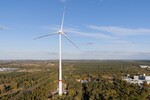10/19/2004
Florida wind farm does well in first year
Standing against the broad horizon like tall tin soldiers with flailing limbs, 27 turbines thrash the air in tempo, turning wind into electricity. The whir of the 110-foot propeller blades atop 213-foot towers is the sweet sound of money to LeRoy Ratzlaff, 76, and his wife, Rena, 74. Seven of the giant windmills perch on their land, and the rental payments provide them extra income and boost the fortunes of the county and nearby Highmore, population 850. "I can't think of any drawbacks to a wind farm at all," says LeRoy Ratzlaff, who raises cattle and wheat. "It's been no problem as far as our farming and ranching operation goes. Maintenance personnel have been very careful about keeping the gates shut, and our activities go on as usual." The Hyde County wind farm, built by FPL Energy of Juno Beach, Fla., began making electricity last October and will start making money for the Ratzlaffs and other landowners in December, when they get their first annual payments.
The power is sold to Basin Electric Power Cooperative of Bismarck, N.D., and then marketed to East River Electric Power Cooperative at Madison and Rushmore Electric Power Cooperative in Rapid City. The wind farm began operating last October. Dean Peterson, former Hyde County Commission chairman, said it's the most important local development in this area since the rural electric system was built decades ago. Benefits from electricity produced by unrelenting prairie winds, once a scourge for early settlers blasted by summer dust and winter blizzards, can boost struggling rural economies and feed the electrical needs of urban centers. "I tell people the wind we've got in South Dakota is at least good for something," Ratzlaff says. For centuries, farmers have used small windmills to pump water for livestock. Decades ago, windmills generated the first electricity for isolated farms and ranches until utilities finally reached them.
Helped by a federal tax credit, wind energy has become economical. Both large and small companies are diving into the business. A wind farm's capacity factor is the actual energy produced during a certain period divided by the energy that would have been produced if turbines had run at maximum output. A capacity factor of 30 percent is considered good. "So far, the Highmore project has the best output and performance of wind farms that the cooperatives in South and North Dakota are involved in, which includes a sister project to the Highmore project near Edgeley, North Dakota," Edwards says. The $42 million Hyde County wind farm can churn out enough power for 10,000 homes. FPL also put $65 million into the Edgeley complex, a 61.5-megawatt wind farm. The American Wind Energy Association says North Dakota, which is ranked No. 1 in wind energy potential, is 13th in actual wind-farm output. South Dakota is ranked fourth in wind power potential and 17th in wind energy production. If both states maximized their wind potential, it is estimated they could supply the needs of nearly 64 million homes.
The power is sold to Basin Electric Power Cooperative of Bismarck, N.D., and then marketed to East River Electric Power Cooperative at Madison and Rushmore Electric Power Cooperative in Rapid City. The wind farm began operating last October. Dean Peterson, former Hyde County Commission chairman, said it's the most important local development in this area since the rural electric system was built decades ago. Benefits from electricity produced by unrelenting prairie winds, once a scourge for early settlers blasted by summer dust and winter blizzards, can boost struggling rural economies and feed the electrical needs of urban centers. "I tell people the wind we've got in South Dakota is at least good for something," Ratzlaff says. For centuries, farmers have used small windmills to pump water for livestock. Decades ago, windmills generated the first electricity for isolated farms and ranches until utilities finally reached them.
Helped by a federal tax credit, wind energy has become economical. Both large and small companies are diving into the business. A wind farm's capacity factor is the actual energy produced during a certain period divided by the energy that would have been produced if turbines had run at maximum output. A capacity factor of 30 percent is considered good. "So far, the Highmore project has the best output and performance of wind farms that the cooperatives in South and North Dakota are involved in, which includes a sister project to the Highmore project near Edgeley, North Dakota," Edwards says. The $42 million Hyde County wind farm can churn out enough power for 10,000 homes. FPL also put $65 million into the Edgeley complex, a 61.5-megawatt wind farm. The American Wind Energy Association says North Dakota, which is ranked No. 1 in wind energy potential, is 13th in actual wind-farm output. South Dakota is ranked fourth in wind power potential and 17th in wind energy production. If both states maximized their wind potential, it is estimated they could supply the needs of nearly 64 million homes.
- Source:
- Online editorial www.windfair.net
- Author:
- Trevor Sievert, Online Editorial Journalist
- Email:
- press@windfair.net
- Keywords:
- USA, Florida, windmill, wind turbine, wind energy, wind farm, offshore, onshore
























